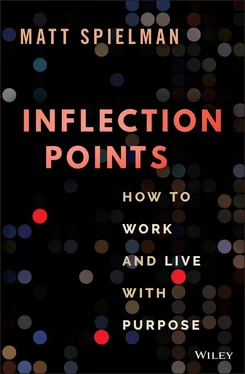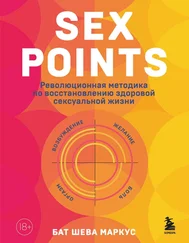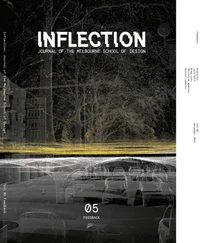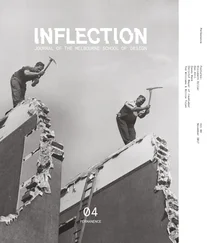Matt Spielman - Inflection Points
Здесь есть возможность читать онлайн «Matt Spielman - Inflection Points» — ознакомительный отрывок электронной книги совершенно бесплатно, а после прочтения отрывка купить полную версию. В некоторых случаях можно слушать аудио, скачать через торрент в формате fb2 и присутствует краткое содержание. Жанр: unrecognised, на английском языке. Описание произведения, (предисловие) а так же отзывы посетителей доступны на портале библиотеки ЛибКат.
- Название:Inflection Points
- Автор:
- Жанр:
- Год:неизвестен
- ISBN:нет данных
- Рейтинг книги:3 / 5. Голосов: 1
-
Избранное:Добавить в избранное
- Отзывы:
-
Ваша оценка:
- 60
- 1
- 2
- 3
- 4
- 5
Inflection Points: краткое содержание, описание и аннотация
Предлагаем к чтению аннотацию, описание, краткое содержание или предисловие (зависит от того, что написал сам автор книги «Inflection Points»). Если вы не нашли необходимую информацию о книге — напишите в комментариях, мы постараемся отыскать её.
Inflection Points: How to Work and Live with Purpose
Inflection Points
Inflection Points — читать онлайн ознакомительный отрывок
Ниже представлен текст книги, разбитый по страницам. Система сохранения места последней прочитанной страницы, позволяет с удобством читать онлайн бесплатно книгу «Inflection Points», без необходимости каждый раз заново искать на чём Вы остановились. Поставьте закладку, и сможете в любой момент перейти на страницу, на которой закончили чтение.
Интервал:
Закладка:
THE GAME PLAN SYSTEM
The answer to this conundrum is the powerful life transformation system I've developed from coaching hundreds of clients (as well as much trial and error in my own life). It's called the Game Plan System, or GPS for short. The acronym is no accident, as the GPS symbolizes an existential navigational tool.
If you don't have a fixed destination, you're merely driving in circles, wasting gas, and squandering time; the longer you stay on the road purposelessly, the more likely it is your trip will end in a highway collision or roadside breakdown. Call it “itinerant inertia,” a rather paradoxical phenomenon if you think about it—being constantly in motion, while at the same time, feeling that you're going nowhere.
It's a widespread, perhaps universal problem, and it afflicts highly accomplished people, as well. It means doing the same thing, and always moving, but never really knowing where you are going, or why. It might look fine from the outside (maybe you have a nice car), but you are the driver, and you need a meaningful trip and a true destination. This must be overcome if one is to get the most from life.
The GPS, therefore, is an apt metaphor: a navigational tool that helps you choose an objective and maps out the route to get there (circumventing roadblocks and handling detours that crop up along the way). In Chapter 2, I'll explain the GPS in depth. Throughout the book, I'll detail how you can build a GPS that allows you to discover and find the means of pursuing genuine purpose in your career and in your life.
IT'S NOT ABOUT “SUCCESS”
One factor that distracted me from discovering what really drove me was that I performed well in almost every job I had, even as I moved from industry to industry. I was committed to my work, but still felt a persistent and perplexing disconnect between career success and personal satisfaction. And after years of coaching, I've learned that my story is not at all uncommon. Many people will stay in a job because they are, by all standards, “good at it”—whether or not they are happy in their role or company. If a person is not gratified with his work, at least in some kind of meaningful way, he will feel it. This dissatisfaction will bleed into other areas of his life, and he will feel drained, and out of balance. With all of the time and energy we put into our careers, it should be something that benefits your life, not adds a burden to it. Ideally, our work should align with our talents, interests, and values. It is how we express ourselves, and a way we create and interact with the world.
In 2020, Gallup released the results of their Q 12Meta Analysis 20-year employee engagement study. According to their research 58% of the workforce (they studied over 2.7 million workers worldwide) are “unengaged,” and another 13% is “actively disengaged.” These employees put time, but not energy or passion, into their work. To be “engaged” means a person is motivated in her job because she sees value in her efforts, is recognized for them, and has opportunities for growth. Engagement signifies a worker is committed to what she does. Most of us have seen an “actively disengaged” co-worker who leaves early, complains (or maybe rarely speaks), perhaps talks about greener pastures elsewhere, and does the absolute minimum required to get a paycheck. This person may not be very reliable, and will quickly leave her company for a slightly better offer. 2 They may perform their job competently, but as my coach Peter shared with me when I started working with him: just because you are good at something, doesn't mean you should do it .
Take Darren, one of my earlier coaching clients, who has also remained a good friend. At the time we met, Darren was a portfolio manager at a hedge fund– a type of money management firm that employs higher-risk methods in the hopes of realizing large capital gains. Darren's charter was to get the highest return on the money he managed. As an expert short seller, that often meant betting against a company's success.
On the first day of coaching, he confessed he was sick and tired of shorting Chipotle stock—waiting for a bad quarter or a salmonella outbreak so he could get out of the position at the right time to make money for the fund. That can be a very negative worldview, setting up to strike when others find failure.
We worked through specific exercises and identified what would be meaningful for him. Darren was drawn, in the end, toward working in nonprofit or some sort of service. He wanted the opportunity to do some good. Contribute more, in his eyes. Others would indeed see “good” in betting against an organization—sending a message to an organization that they need to do better. It is one of the tools of accountability. It's not my, or anybody's, role to tell somebody what their definition of “good” is. Rather, it is to foster a discussion—and a partnership—to help them realize what it is for them. For Darren, he identified what would generate more energy and provide more meaning to his day-to-day.
Darren is now a curator for an internationally renowned speaking organization, where he finds innovative and inspiring speakers and puts together the slate for conferences. He gets to spend his time finding guests who can both entertain and enlighten, and then help these speakers prepare the best talk they can possibly deliver.
He had the courage to take a jump, and now he's excited about what he does every day. His daily life is in alignment with his desire to express himself, and he's much happier for it. It was a deliberate and intentional move, informed by conversations and exploration.
What Darren, many other clients, and I, myself, could tell you is that one of the reasons people can be hesitant to examine their lives is that they are worried about what they will learn. There is the risk that you would look at your life and suddenly realize you are on the wrong path completely. Are you going to need to make drastic changes?
These are emotionally charged questions and considerations, and they constitute one of the major impediments that your GPS must navigate around. I've created a step-by-step process where I can help people identify the right questions to ask and what to do with the answers we find. I work through them with clients and it helps them crystalize their ideas about where they are as well as where they want to be. Where they are today and where they want to be tomorrow.
First, I like to dispense with the ideas of life's purpose and your true passion and calling at this stage. The terms themselves, purpose and passion, can be overwhelming; we've assigned a heavy load of cultural baggage to these words. They are incredibly important and valid topics—and are useful—but the expectations that these concepts carry can be paralytic in nature. We often feel intimidated to think that we must unravel our specific life's greatest mystery, when approached with life purpose and passion, and the actual words get in the way of us moving forward. There is indeed a place for them, just not at the start. Instead, let's simplify. Starting from a place of lightness, ask yourself: What do you like to do? What do you need to do? How do you want to spend your time? What are the sorts of results you'd like to see? What impact do you want to have? What do you truly enjoy?
Starting with that line of inquiry tends to leave people excited and energized. They aren't scared of the big, unmanageable questions because we're working with small and manageable steps. They are lit up with the possibilities. They're curiously beginning to see the ways they can develop a life that works for them and that resonates with their innermost values and desires. I observe what happens to my clients as they open to the possibilities with this kind of inquiry. I follow their energy for clues. I listen not only to the words people say, but also how they say them. As a coach, I look for and follow energy. It's the truest indication, signal, of what my clients really want, even if they don't yet have the language to articulate it. Energy may hide. But it doesn't lie.
Читать дальшеИнтервал:
Закладка:
Похожие книги на «Inflection Points»
Представляем Вашему вниманию похожие книги на «Inflection Points» списком для выбора. Мы отобрали схожую по названию и смыслу литературу в надежде предоставить читателям больше вариантов отыскать новые, интересные, ещё непрочитанные произведения.
Обсуждение, отзывы о книге «Inflection Points» и просто собственные мнения читателей. Оставьте ваши комментарии, напишите, что Вы думаете о произведении, его смысле или главных героях. Укажите что конкретно понравилось, а что нет, и почему Вы так считаете.











